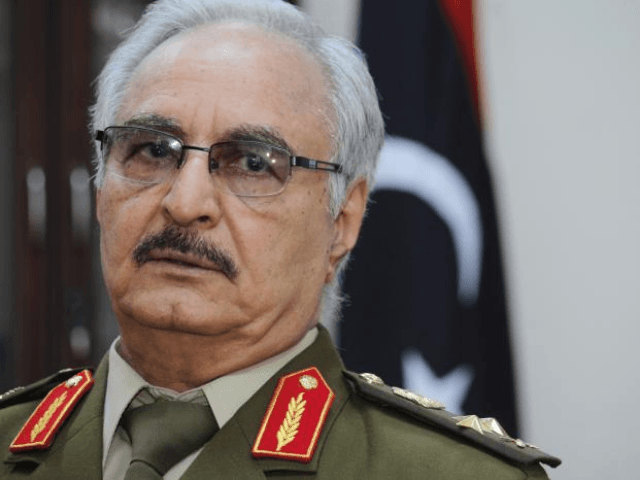The Libyan National Army, led by renegade Gen. Khalifa Haftar, claimed Sunday to possess documents and other evidence showing that Turkey and its President Recep Tayyip Erdogan support the Islamic State (ISIS/ISIL).
Libya was once considered ISIS’s largest stronghold outside of its now-fallen caliphate in Iraq and Syria. Although U.S.-backed local fighters pushed the jihadi group out of its bastion in the coastal city of Sirte, the group still poses a threat to the North African country.
On Sunday, the LNA wrote on its official Twitter account, “#Turkey is one of the countries supporting terrorism around the world. … We possess leaked #Turkish documents and other evidence that prove the Turkish regime’s support for #ISIS”:
We posses leaked #Turkish documents and other evidence that prove the Turkish regime’s support for #ISIS.
— LNA Spox. (@LNASpox) April 28, 2019
Several analysts have accused Ankara of supporting ISIS by turning a blind eye to the many foreign fighters who traveled through Turkish soil to join the jihadi group in its so-called caliphate, ignoring the terrorist organizations illegal smuggling of oil out of its territory in Iraq and Syria, among other things.
ISIS has claimed responsibility for deadly attacks inside Turkey. Moreover, Turkey is part of the U.S.-led coalition against ISIS, allowing alliance warplanes to fly out of its territory. Turkey’s military actions against ISIS have been primarily focused on preventing the U.S.-backed Kurdish forces from consolidating control of their territory in northern Syria, along the Turkish border. Ankara considers the Syrian Kurdish fighters to be terrorists. The Kurds helped the U.S.-led coalition annihilate ISIS’s so-called caliphate last month.
Throughout the war against ISIS, Turkey’s primary focus has been fighting the Syrian Kurds, which Ankara believes maintains an affiliation to the Kurdistan Worker’s Party (PKK), a U.S.-designated terrorist group that has been waging an insurgency on Turkish soil for decades.
The LNA has been fighting on behalf of the breakaway government in eastern Libya’s Tobruk region. Gen. Haftar is considered the Tripoli-based Government of National Accord’s (GNA) primary rival. On April, 4 Haftar launched an offensive against the United Nations-brokered GNA in Tripoli despite opposition by various countries.
Echoing previous accusations, the LNA also suggested on Sunday that al-Qaeda continues to back the GNA, the U.N.-brokered Government of National Accord (GNA).
“We are fighting the internationally recognized terrorist group Al-Qaeda in #Tripoli,” it wrote.
Last weekend, the LNA claimed al-Qaeda and its rival ISIS deployed reinforcements to the legitimate government of Libya.
On Friday, Amb. Bashar Jaafari, the Syrian envoy to the U.N., accused Turkey of backing al-Qaeda-linked jihadists who control the last rebel enclave in Syria — the Idlib region, Al Masdar News reported.
Although they are on opposite sides of the conflict, Syrian dictator Bashar al-Assad’s ally Russia and pro-opposition Turkey have been working together to take back Idlib from the jihadis to no avail. Russia blames Turkey for the failure.
The LNA has conquered most of Libya’s territory, primarily in the east and south, with the support of Russia, France, Egypt, Saudi Arabia, and the United Arab Emirates (UAE).
Haftar’s foreign supporters believe the warlord can restore stability and effectively combat jihadi groups in the country as he has done in the past.
Libya has descended into chaos since the U.S. and NATO-backed overthrow and execution of dictator Muammar Gaddafi in 2011, becoming a fertile ground for jihadis while two governments compete for power and influence.
Although the LNA has pushed al-Qaeda and ISIS out of several areas, human rights groups have recently accused the force of war crimes.
Critics have accused U.S. President Donald Trump of sending mixed messages about Libya after the White House announced the American commander-in-chief spoke to general Haftar amid the ongoing Tripoli offensive.
The president “recognized Field Marshal Haftar’s significant role in fighting terrorism and securing Libya’s oil resources, and the two discussed a shared vision for Libya’s transition to a stable, democratic political system,” the White House noted.
The United States has been backing the GNA since its formation in 2016.
Soon after taking office, President Trump explicitly said he did not see a role for the United States in Libya’s political woes, noting that American presence in the North African country would be focused on fighting ISIS.

COMMENTS
Please let us know if you're having issues with commenting.